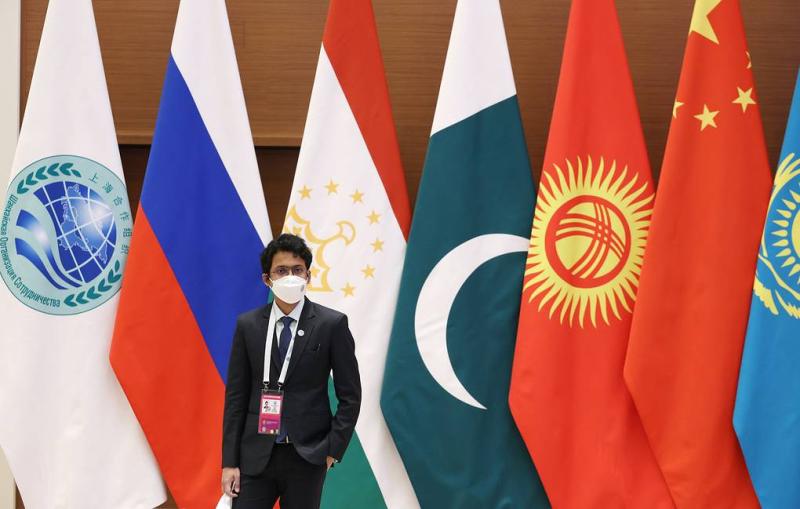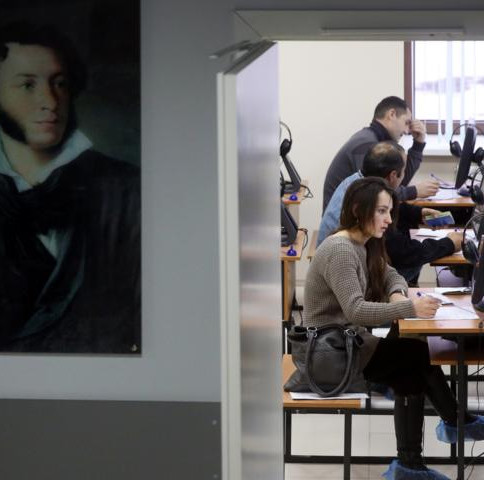
© Sergei Bobylev/TASS
Top stories from the Russian press on Friday, September 16th, prepared by TASS
Izvestia: Russia boosts ties with China, Iran at SCO summit
Russia highly appreciates China’s balanced position on the crisis in Ukraine, Russian President Vladimir Putin said on September 15 during a meeting with Chinese President Xi Jinping. The dialogue between Moscow and Beijing became the main event of the first day of the SCO summit. Although China continues to maintain a diplomatic approach to the ongoing special operation in Ukraine, both leaders reaffirmed their intention to strengthen the multipolar world, Izvestia writes. On the same day, Iran signed a memorandum to join the organization.
Opening the talks, Putin noted that Russia highly appreciates China’s "balanced position regarding the Ukrainian crisis." There was no greater clarity about what the Chinese position was. Nevertheless, Moscow and Beijing reaffirmed their intention to bolster the multipolar structure of international relations.
China’s position alarms the collective West. The EU and the US believe Russia can effectively circumvent sanctions with the help of the Chinese. However, according to Chief Researcher at the Center for Political Studies and Development Forecasts of the Institute of China and Modern Asia Vladimir Portyakov, the West’s concerns are unfounded. "China really fears secondary sanctions and Huawei has even reduced its presence in Russia," he said, adding that China now has a lot of its own problems both in the economy and in international relations.
The Russian-Iranian talks were also a key event. Tehran and Washington cannot yet find common ground on all issues that would enable the revival of the JCPOA. In addition, Iran, which on September 15 signed a memorandum on joining the SCO, remains a key player in Syria, Izvestia writes.
According to the orientalist Roland Bidzhamov, Moscow and Tehran bolstering ties under the current conditions, when both countries are under tough sanctions, is inevitable. The expert recalled that the Iranian market is attractive for Russian companies in terms of investment, including in the development of gas fields and infrastructure projects. On the other hand, Iran is capable of supplying Russia not only with food, but also, for example, with automotive products.
Nezavisimaya Gazeta: US senators introduce bill to designate Russia as state sponsor of terrorism
Democratic Senator Richard Blumenthal of Connecticut and Republican Senator Lindsey Graham of South Carolina have trotted out an already sensational initiative to label Russia as a state sponsor of terrorism, despite the fact that the State Department and the White House may not want to support it, Nezavisimaya Gazeta writes. According to experts, such a radical step would be reckless and short-sighted. Even in spite of the disagreements between Moscow and Washington, the two major nuclear powers need channels for communication and cooperation.
In any case, the initiative is not consistent with the official position of the White House, the newspaper writes. The cost of such a step can be quite high - breaking diplomatic relations with Moscow in the event of agreement with the initiative of Graham and Blumenthal will be almost inevitable.
Although there may be some benefits. For example, the United States will be able to expropriate Russian gold and foreign exchange reserves in the amount of $300 bln.
"On the one hand, the White House has a policy to help Ukraine, which is shared by Biden’s military advisers. On the other hand, Washington has to understand that completely severing ties is unprofitable, and in any case, there must be a certain way for reaching a compromise," leading researcher at the Institute for US and Canadian Studies of the Russian Academy of Sciences Nikolay Popov told the newspaper.
He stressed that before the November elections, the White House would not want to worsen relations with Moscow now that the Democrats' ratings have improved. In general, the domestic agenda is more important for voters, and it is precisely what Biden is currently most actively focused on.
Izvestia: Washington may limit work of Russian delegation in the UN
The Russian delegation, part of which has already obtained US visas to attend the UN General Assembly, may face new obstacles. It is possible that they will be banned from holding meetings outside the UN site and their movement will be restricted within 40 km from the headquarters, former UN Deputy Secretary General Sergey Ordzhonikidze and Deputy Chairman of the Federation Council Konstantin Kosachev told Izvestia. This is especially true for members of the delegation under sanctions, they warned.
The General Assembly participants are still waiting for their visas and are not yet concerned about this issue, but if such measures are introduced, "then this will utterly worsen the situation," according to Senator Grigory Karasin, who was part of the delegation officially approved by the president. According to him, the failure of the United States to fulfil its obligations to UN member states raises the question of their ability to retain such powers.
Dmitry Polyansky, First Deputy Permanent Representative of Russia to the UN, also told Izvestia about the risks if not all of the Russian delegation members get visas. According to him, such incidents have already happened.
Russian representatives at the General Assembly also may be banned from leaving Manhattan, the area where the UN headquarters is located, or even moving further than 40 km, Ordzhonikidze suggested. Moreover, according to him, this is highly probable. The US has already introduced similar measures in a similar situation with respect to Iran’s delegates, he noted.
Nezavisimaya Gazeta: Brussels promises Ukraine access to EU market
Speaking to the European Parliament, President of the European Commission Ursula von der Leyen revealed that as part of her next visit to Kiev, she planned to discuss Ukraine's progress in the EU and review issues of its access to the single European market, as well as the free roaming zone. Experts interviewed by Nezavisimaya Gazeta questioned the effectiveness of the steps taken by the EU to support Ukraine ahead of the difficult winter season for both sides.
Head of the analytical department of Vostochnye Vorota Investment Company Alexander Timofeev suggested that the mentioned steps could be designed to replace real progress in Ukraine's accession to the EU.
Meanwhile, Director of the Institute for Economic Forecasting of the Russian Academy of Sciences Alexander Shirov told the newspaper that access to the European market was provided for Ukraine by an association agreement with the EU, which was actively discussed in 2013 and signed in 2014. It is possible that this time Kiev will receive some more exemptions, but they will not be conclusive. As for the prospects for joining the EU, the expert believes that in the current conditions they look unrealistic, as it seems that Ukraine does not yet have the resources to correct the economic situation or improve its system of administration.
According to Director of the Center for Eurasian Studies at MGIMO University Ivan Safranchuk, the visit is connected with the current stage in hostilities, marked by the advance of Ukraine’s military in several districts of the Kharkov region. "That is why Brussels intends to cheer up the Kiev leadership in every possible way. Although, on the other hand, they understand how fleeting the moment of good luck is, and they will strive to extend it as much as possible," he told the newspaper.
Vedomosti: Bank of Russia wants to raise number of countries accepting Mir cards to 35 by 2030
According to a joint presentation from the regulator and the Ministry of Finance, the Bank of Russia intends to increase the geographic reach of the Russian payment system Mir to 20 countries by 2025 and up to 35 by 2030, Vedomosti writes. Currently, Mir cards are accepted in 11 countries: Turkey, Vietnam, South Korea, Armenia, Uzbekistan, Belarus, Kyrgyzstan, Tajikistan, Kazakhstan, South Ossetia, and Abkhazia.
The plans by the Bank of Russia to expand the number of countries accepting Mir cards are quite real, leading analyst for bank ratings at the Expert RA agency Evgeny Romanov believes. Popular tourist destinations in the Asia-Pacific region, Latin America, and the Middle East can be first added to the list.
Negotiations on the use of Mir cards are underway in countries such as Cuba, Thailand, Egypt, the United Arab Emirates, Myanmar, Venezuela, Iran, Indonesia, Bahrain, China, India, Sri Lanka, Azerbaijan, Cyprus, Nigeria, Romanov said. At the same time, the preparation time for the actual acceptance of Russian cards can take up to a year, the expert added.
This expansion is a logical move from a financial point of view for countries which many tourists from Russia visit, as well as traditional regions that are sources of labor migrants, First Vice President of the Center for Strategic Research Boris Kopeikin noted.
In the coming years, the role of the dollar and the euro in the world will decline, while the role of regional currencies will increase, chief analyst at Sovcombank Mikhail Vasiliev expects. According to his forecasts, various countries will actively develop their payment systems, independent of the US and the EU.









